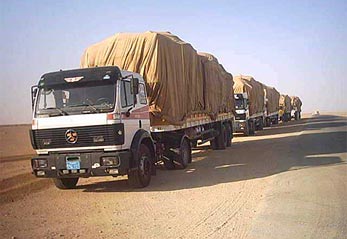UNHCR calls on states to extend protection for Iraqis
UNHCR calls on states to extend protection for Iraqis

GENEVA, August 12 (UNHCR) - The UN refugee agency has advised states to preserve a ban on forced returns to Iraq, including of rejected asylum seekers. UNHCR also advised states that temporary forms of protection should continue to be granted to Iraqis, including to newly arrived asylum seekers.
States should also be aware that any continuing deterioration of physical and material safety may still lead to forced displacements from Iraq, the agency advised governments worldwide.
These recommendations follow recent missions to Iraq by High Commissioner Ruud Lubbers and his Special Envoy, Dennis McNamara, during which they concluded that conditions prevailing in Iraq are not yet conducive to return.
According to UNHCR, Iraq is experiencing considerable security problems and an absence of law and order in many areas of the country, while the provision of basic services such as water, electricity and medical care are irregular. The agency also warned that Iraq is experiencing a severe housing shortage and that many people remain dependent upon UN food handouts.
Despite the repatriation in late July of 244 Iraqi refugees from Saudi Arabia's Rafha camp - the first such movement since the fall of the former government - UNHCR said that it was not promoting return to Iraq, and would not do so until conditions in the country become conducive to larger scale return.
The refugee agency said its second repatriation convoy that left Rafha on Sunday was delayed due to security restrictions in the southern Iraqi city of Basra, following a weekend of unrest when angry crowds clashed with British forces.
The some 250 returning refugees are waiting in an empty pilgrim facility at Ar Raq'i, near Saudi Arabia's border with Kuwait, until August 16, when UNHCR said that it expected the situation in Basra to have improved such that the convoys from Rafha could resume.
The agency only expects limited numbers of refugees to return to Iraq this year, all people clamouring to return home despite the difficult conditions. UNHCR recognises that refugees can exercise their right to return, and is closely co-ordinating the repatriation movements with the Coalition Provisional Authority to ensure that returns take place in a gradual and orderly manner, in view of Iraq's fragile absorption capacity.
The refugee agency also warned that it was not in favour of resuming the review of individual Iraqi asylum claims, and called on states to follow suit.
UNHCR asked states to be mindful that, in the absence of an effective national protection apparatus due to the lack of police and other administrative services in many areas of Iraq, possible claims of persecution by "non-state agents" should be considered by any government opting to examine requests by Iraqis seeking refugee status.
The agency also said that no Iraqi asylum seekers should be returned to other countries in the region regardless of prior stay or transit during their flight to asylum.









